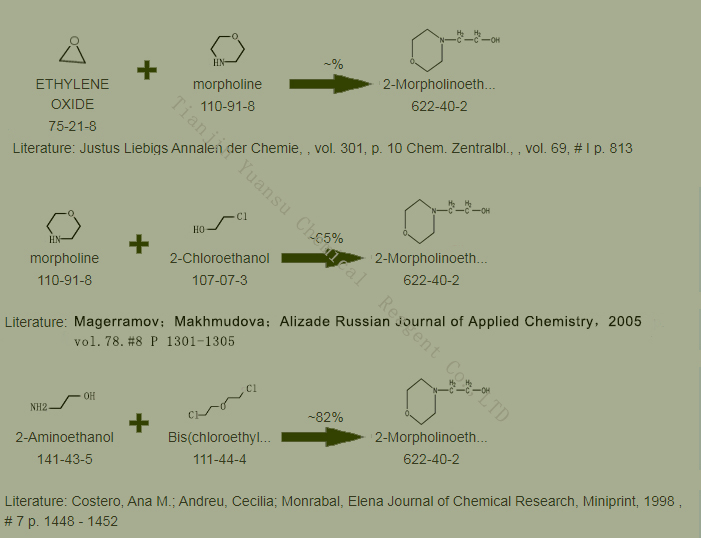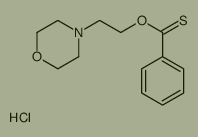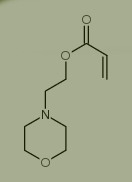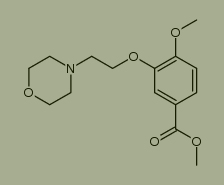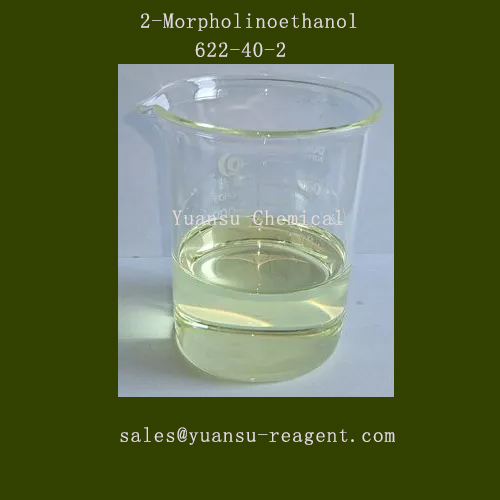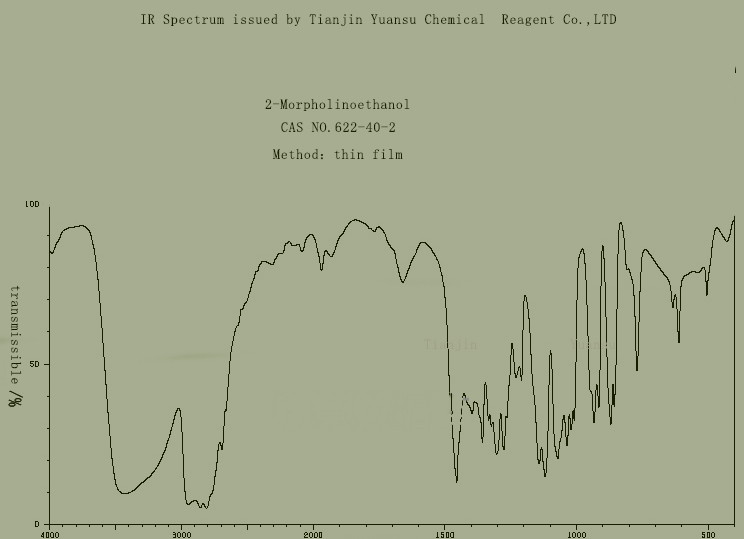2-Morpholinoethanol
What is 2-Morpholinoethanol, cas no:622-40-2,a producer telling you the result.
CAS NO.622-40-2
If you need the products .Please send your inquiry to us through e-mail: sales@yuansu-reagent.com
To begin with, let us tell you what is the basic information of 2-Morpholinoethanol ?
|
Molecular Formula |
C6H13NO2 |
Molecular Weight |
131.173 |
|
Density |
1.1±0.1 g/cm3 |
Boiling Point |
224.4±20.0 °C at 760 mmHg |
|
Flash Point |
99.4±0.0 °C |
Melting Point |
-1 °C |
Like many stuff, it has many synonyms as follows
|
MFCD00006180 |
|
EINECS 210-734-5 |
|
2-Morpholinoethanol |
|
2-(4-Morpholinyl)ethanol |
|
β-Morpholinoethanol |
|
2-morpholin-4-ylethanol |
|
2-(morpholin-4-yl)ethanol |
First, the chemical is very special, some technical indexes as below
If you need the products .Please send your inquiry to us through e-mail: sales@yuansu-reagent.com
Physical property data
1. Appearance: Colorless liquid
2. Density (g/mL, 25/4 ℃): 1.08
3. Relative vapor density (g/mL, air=1): not determined
4. Melting point (º C): 1-2
5. Boiling point (º C, atmospheric pressure): 226-228
6. Boiling point (º C, 5.2kPa): undetermined
7. Refractive index: 1.476
8. Flash point (º C): 99
9. Specific rotation (º): not determined
10. Spontaneous combustion point or ignition temperature (º C): 205
11. Vapor pressure (kPa, 25 º C): 1.8
12. Saturated vapor pressure (kPa, 60 º C): not determined
13. Combustion heat (KJ/mol): undetermined
14. Critical temperature (º C): not determined
15. Critical pressure (KPa): undetermined
16. Logarithmic value of oil-water (octanol/water) partition coefficient: undetermined
17. Explosion upper limit (%, V/V): 1.5
18. Lower explosive limit (%, V/V): 9.8
19. Solubility: completely soluble in water
toxicology data
1. Acute toxicity: Rat LD50 (oral): 3250 mg/kg
Mouse (peritoneal) LD50: 2400 mg/kg
Mouse (subcutaneous) LD50: 2400 mg/kg
Mouse (extraintestinal) LD50: 2400 mg/kg
Rabbit (skin) LD50: 2400 mg/kg
Pig (skin) LD50: 2400 mg/kg
Ecological data
Do not allow undiluted or large quantities of products that are slightly harmful to water to come into contact with groundwater, waterways, or sewage systems. Do not discharge materials into the surrounding environment without government permission.
Molecular structure data
1. Molar refractive index: 34.48
2. Molar volume (cm3/mol): 123.6
3. Waiting ratio (90.2K): 304.3
4. Surface tension (dyne/cm): 36.7
5. Polarization rate (10-24cm3): 13.66
Calculate chemical data
1. Reference value for hydrophobic parameter calculation (XlogP): -0.8
2. Number of hydrogen bond donors: 1
3. Number of hydrogen bond acceptors: 3
4. Number of rotatable chemical bonds: 2
5. Number of tautomers: None
6. Topological molecule polarity surface area 32.7
7. Number of heavy atoms: 9
8. Surface charge: 0
9. Complexity: 71.5
10. Number of isotopic atoms: 0
11. Determine the number of atomic stereocenters: 0
12. Uncertain number of atomic stereocenters: 0
13. Determine the number of chemical bond stereocenters: 0
14. Number of uncertain chemical bond stereocenters: 0
15. Number of covalent bond units: 1
Nature and stability
Avoid oxides, acids, air, and carbon dioxide.
Storage method
Store in a sealed container filled with inert gas and in a cool, dry place. Keep away from air, oxidants, and light.
Second, the Synthetic Route we will recommend is the most important for your reference?
First, synthesis line of 2-Morpholinoethanol CAS NO.622-40-2 as follows
Obtained by the addition of morpholine and ethylene oxide. Introduce ethylene oxide gas into morpholine for reaction, control the temperature below 20 ℃, and hold for half an hour after completion. Heat and evaporate the water until it is completely removed, then distill the residual liquid under reduced pressure. Collect the 122-126 ℃ (1.33kPa) fraction to obtain morpholine ethanol.
There are two main methods for preparing N - (2-hydroxyethyl) morpholine:Reacting morpholine with 2-chloroethanol yields N - (2-hydroxyethyl) morpholine.Reaction of sodium hydroxide and 2-chloroethanol in the presence of hydrogen chloride yields N - (2-hydroxyethyl) morpholine.
Third, what is the usage of 2-Morpholinoethanol CAS NO.622-40-2 ? pleas see below
If you need the products .Please send your inquiry to us through e-mail:sales@yuansu-reagent.com
Usage:
N - (2-hydroxyethyl) morpholine is commonly used in organic synthesis as a catalyst, reagent, or solvent. It is mainly used in esterification, acylation, amidation and other reactions, which helps to improve reaction rate and yield.
Other usage:
Used for the synthesis of O-(2-morpholin-4-ium-4-ylethyl) benzenecarbothioate,chloride Cas no. 109506-39-0
Used for the synthesis of 2-morpholin-4-ylethyl prop-2-enoate Cas no. 19727-38-9
Used for the synthesis of 4-Methoxy-3-(2-morpholin-4-yl-ethoxy)benzoic acid methyl ester Cas no. 250726-35-3
Besides Safety Information of 2-Morpholinoethanol CAS NO.622-40-2 is also important when handling it
|
Hazard Codes |
Xi |
|
WGK Germany |
3 |
|
H.S.Code: |
2933 3990.99 |
|
TSCA |
Yes |
|
HazardClass |
IRRITANT |
What is the appearance of 2-Morpholinoethanol CAS NO.622-40-2? Please see the picture of 2-Morpholinoethanol CAS NO.622-40-2, below
If you need the products .Please send your inquiry to us through e-mail: sales@yuansu-reagent.com
Specification of 2-Morpholinoethanol CAS NO.622-40-2, is below
Apperance:colorless to light yellow liquid
Assay: 99 min by GC
IR identity: conform
IR picture of 2-Morpholinoethanol CAS NO.622-40-2 is as follows,
HNMR Spectrum of 2-Morpholinoethanol CAS NO.622-40-2 is as follows,
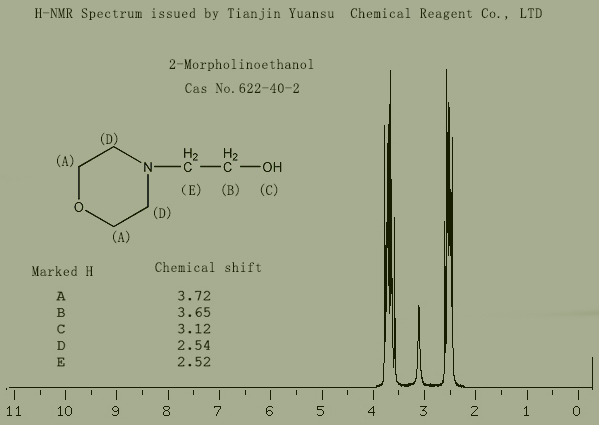
Reference of Article cited for your reference below,
(1)
Publication Name: Synthesis
Publication Date: 2022-02-07
(2)
Piperazine-immobilized polymeric membranes for CO2 capture: mechanism of preferential CO2 permeation
Publication Name: Polymer Journal
Publication Date: 2020-07-29
DOI: 10.1038/s41428-020-0389-7
(3)
Publication Name: Reviews and Advances in Chemistry
Publication Date: 2022-06


